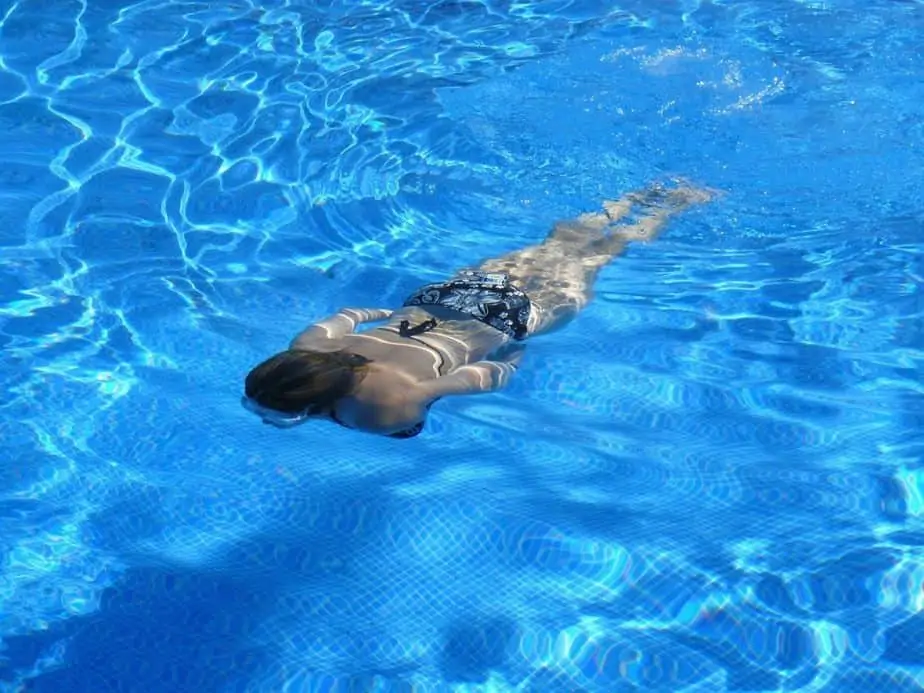Despite being chlorinated, swimming pools can be a breeding ground for germs, particularly heated pools, which provide an oasis for all kinds of bacteria. The warm water combined with urine, sweat, dirt, oil, and body products from people not showering before they swim, and low levels of chlorine can cause any number of health issues, including urinary tract infections (UTIs).
Swimming pools can be a breeding ground for germs.
What is a Urinary Tract Infection?
A urinary tract infection, or UTI, is an infection that occurs in the urinary system, which includes the bladder, kidneys, urethra, and ureter. A UTI can be bacterial or viral and may occur in any of these areas of the urinary system.
Most urinary tract infections are bacterial and occur in the bladder after bacteria has entered the urinary tract and traveled up to the bladder. Such infections in the bladder are known in medical terms as cystitis. Urinary tract infections involving the kidney are more common in older adults and more serious and can result in sepsis or death if left untreated.
What Causes a Urinary Tract Infection?
Urinary tract infections are caused by bacteria entering the urinary tract and traveling to the bladder. Bacteria from the large intestine, such as E. coli, can also sometimes move from the anus (from wiping back to front) into the urethra and travel up to your bladder or onwards to the kidneys.
Women have shorter urethras than men, which makes it easier for bacteria to get into the bladder, making them more susceptible to getting UTIs.
Common causes of urinary tract infections include:
- Swimming in heated public pools (unclean water)
- Frequent, intense sexual intercourse with multiple or new partners
- Poor personal hygiene
- Bladder issues/bowel incontinence
- Pregnancy
- Menopause
- Diabetes
- Kidney stones
- Some forms of contraception
- Suppressed immune system
- Immobility for long periods
- Regular use of antibiotics (disrupts the natural flora of the bowel and urinary tract)
Other conditions that can increase the risk of urinary tract infections include hormonal changes, kidney stones, stroke, multiple sclerosis, and spinal cord injuries.
Common causes of urinary tract infections include swimming in heated public pools (unclean water).
What Increases the Risks of Getting a UTI?
Due to their anatomy, women are four times more likely than men to get a UTI and tend to have repeat infections, sometimes for years on end. Only one in ten men will suffer a UTI in their lifetime. Urinary tract infections are commonly caused by being in warm or heated swimming pools, warm baths, wearing wet underwear or swimsuits, and dehydration.
How Does Swimming Cause UTIs?
Bacteria tend to thrive in warm and moist environments with environmental PH and oxygen levels that are similar to those in the human body. Public swimming pools are full of bacteria from urine (yes, people do pee in the pool), body oil, sweat, dirt, microbes, and body products like deodorant, hair products, sunscreen, and body creams.
If the swimming pool does not have sufficient levels of chlorine to keep bacteria at bay, the pool becomes a breeding ground for infections, illnesses, and other issues.
Due to their anatomy, women are four times more likely than men to get a UTI.
What are the Symptoms of a Urinary Tract Infection?
The symptoms of a urinary tract infection can include:
- A frequent or intense need to urinate, even if the bladder is empty
- A burning sensation when urinating
- Cloudy, bloody, dark, or strange-smelling urine
- Exhaustion, dizziness, shakiness
- Lower abdomen and back pain
- Chills and fever (these may be signs that the infection has moved into the kidneys)
Types of Urinary Tract Infections (UTIs)
A urinary tract infection can occur in different parts of the urinary system. Each infection has a different name, based on where the infection is located.
- Cystitis: This type of infection occurs in the bladder and is the most common form of UTIs, particularly in women. Symptoms include a frequent or intense need to urinate, a burning sensation when urinating, lower abdomen pain, and cloudy or bloody urine.
- Urethritis: This type of infection occurs in the urethra and can cause a burning sensation when urinating and a strange-smelling discharge.
- Pyelonephritis: This type of infection occurs in the kidneys and is the most serious of the infection types. This infection can cause chills, fever, nausea, pain in the lower and upper back, and vomiting.
A urinary tract infection can occur in different parts of the urinary system.
How to Avoid Getting a UTI When Swimming
While a crowded swimming pool with warm water may be a breeding ground for all types of bacteria, there are ways to avoid getting a urinary tract infection after swimming.
- Shower before and after getting in the pool.
- Don’t swallow pool water.
- Drink plenty of water.
- Take breaks every hour.
- Test the water with a portable test strip.
- Get out of wet swimwear whenever possible.
Shower Before and After Getting in the Pool
Research shows that one swimmer can shed billions of microbes in the water, including fecal particles, so always shower for at least 60 seconds before getting into the pool and have a good scrub afterward. A short minute-long rinse is enough to remove any bacteria on your own body before getting in, and a good scrub with soap after your swim will remove any bacteria picked up during the swim.
Don’t Swallow the Water
Swimmers will ingest water while swimming without realizing it – studies show that during 45 minutes of swimming, the average adult consumes a tablespoon of pool water and children twice as much. Avoid taking in water by keeping your mouth closed and wearing nose plugs when going under. Drink plenty of water after your swim to flush your system of the pool water.
Stay Hydrated
Whether you are enjoying a hard swim workout in the pool or spending hours in the sun splashing about, it is essential to stay hydrated by drinking plenty of water throughout the day. Drinking water will not only flush your system of any bacteria that may have been ingested while swimming, but it will also help prevent getting a urinary tract infection.

Take Hourly Breaks from the Water
According to the Centers for Disease Control and Prevention (CDC), it is recommended to take a break from the pool every hour for a bathroom break, a shower, and a rest from the exposure to the water.
Pack a Portable Test Strip
If you are worried about picking something up from the pool, you can test the water with a portable test strip, which can be purchased online or at a variety of health and pool shops. You can also order a free test kit from the Water Quality and Health Council.
A portable test strip will indicate whether the chlorine or the PH levels in the pool are off, which can lead to a spread of bacteria and infections to occur.
How is a Urinary Tract Infection Treated?
There are several ways of treating a urinary tract infection that will depend on the symptoms and medical history of the individual.
1. Antibiotics / Antimicrobials
A urinary tract infection in the bladder is commonly treated with a course of antibiotics, as long as there are no other more serious symptoms like chills, high fever, severe lower back pain, or vomiting as this may indicate an infection in the kidneys.
The full course of antibiotics should always be completed even if symptoms disappear to reduce the risk of antibiotic resistance. Uncomplicated urinary tract infections usually clear up after a three-day course of antibiotics.
More complicated infections tend to occur in people who have comorbidities such as diabetes, high blood pressure, immunodeficiency disease, or are pregnant, and may require longer periods of antibiotics of between seven to 14 days.
If left untreated, an uncomplicated infection can become complicated and lead to kidney damage, and more serious issues. If an infection does not clear up after a course of antibiotics, the person may have to be submitted to the hospital.
People suffering from unrelenting urinary tract infections may also need to go to the hospital if they are one of the following:
- pregnant
- older adults or elderly patients
- individuals with diabetes, cancer, multiple sclerosis, spinal cord injury, or other serious medical problems
- individuals with urinary tract problems or kidney stones
- individuals recovering from urinary tract surgery
2. Home Remedies
There are several suggested remedies for urinary tract infections that may be tried. It is important to monitor the symptoms, and if they do not appear to be easing, seek medical attention.
Cranberry Extract
Research shows that cranberries or cranberry extract help with the prevention of urinary tract infections. The compounds in cranberries called proanthocyanidins prevent E. coli from sticking to the walls of the digestive and urinary tract.
Clinical trials on one group of women with recurrent urinary tract infections found that those who took 500 milligrams (mg) of cranberry extract over six months showed a 35 percent reduction in infections. It showed that cranberry extract reduced the rate of infections with the same effectiveness as the antibiotic, trimethoprim, without the risk of antimicrobial resistance.
Cranberry extract also contains anthocyanins and salicylic acid, which are believed to have anti-inflammatory and pain-killing effects that help relieve the symptoms of urinary tract infections. Cranberry extract tablets are proven to be more effective than cranberry juice as they do not have the same sugar content as the juice.

Water
Drink plenty of water and fluids to stay hydrated and flush the system of any harmful bacteria that may be lurking around.
3. Probiotics
Regular use of probiotics also plays a role in the reduction of urinary tract infections. Changes in the balance of the natural flora of the genitourinary tract can lead to colonization by organisms such as E. coli and regular use of probiotics can prevent these changes.
Probiotics can be found in natural foods like yogurt or supplemental forms like powder or tablets. In particular, Bifidobacterium longum can prevent unhealthy bacteria from attaching to the intestinal tract walls. It also enhances the production of natural antibacterial chemicals and organic acids within the digestive and genitourinary systems.
Final Thoughts
Research shows that crowded swimming pools or pools shared by many people daily carry the risk of a variety of infections, ranging from bacterial skin and nasal infections to vaginal infections and urinary tract infections.
Therefore, it’s vitally important to practice hygienic methods when using the swimming pool to prevent exposure to potentially deadly bacteria. From taking a shower before and after you swim to avoiding swallowing pool water, taking hourly breaks, changing out of wet swimming gear, and staying hydrated by drinking plenty of water throughout the day.
Stay safe and happy swimming!

Jacky has a degree in Sports Science and is a Certified Sports and Conditioning Coach. He has also worked with clients around the world as a personal trainer.
He has been fortunate enough to work with a wide range of people from very different ends of the fitness spectrum. Through promoting positive health changes with diet and exercise, he has helped patients recover from aging-related and other otherwise debilitating diseases.
He spends most of his time these days writing fitness-related content of some form or another. He still likes to work with people on a one-to-one basis – he just doesn’t get up at 5am to see clients anymore.





